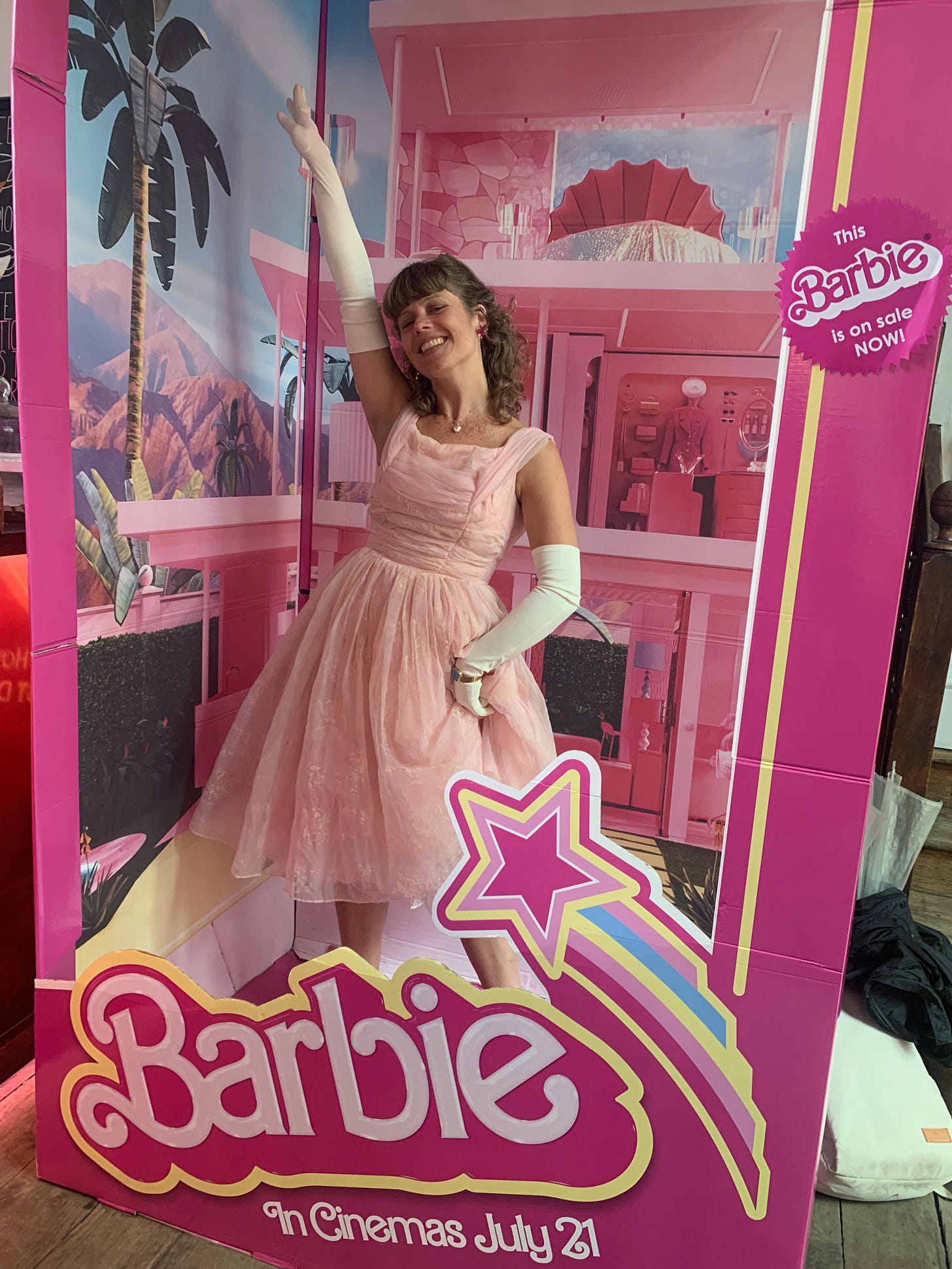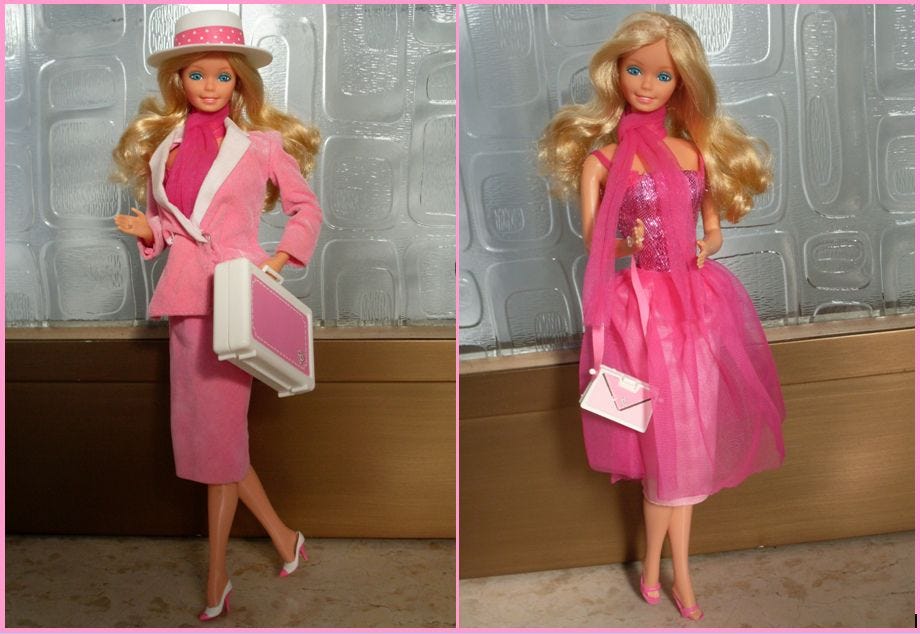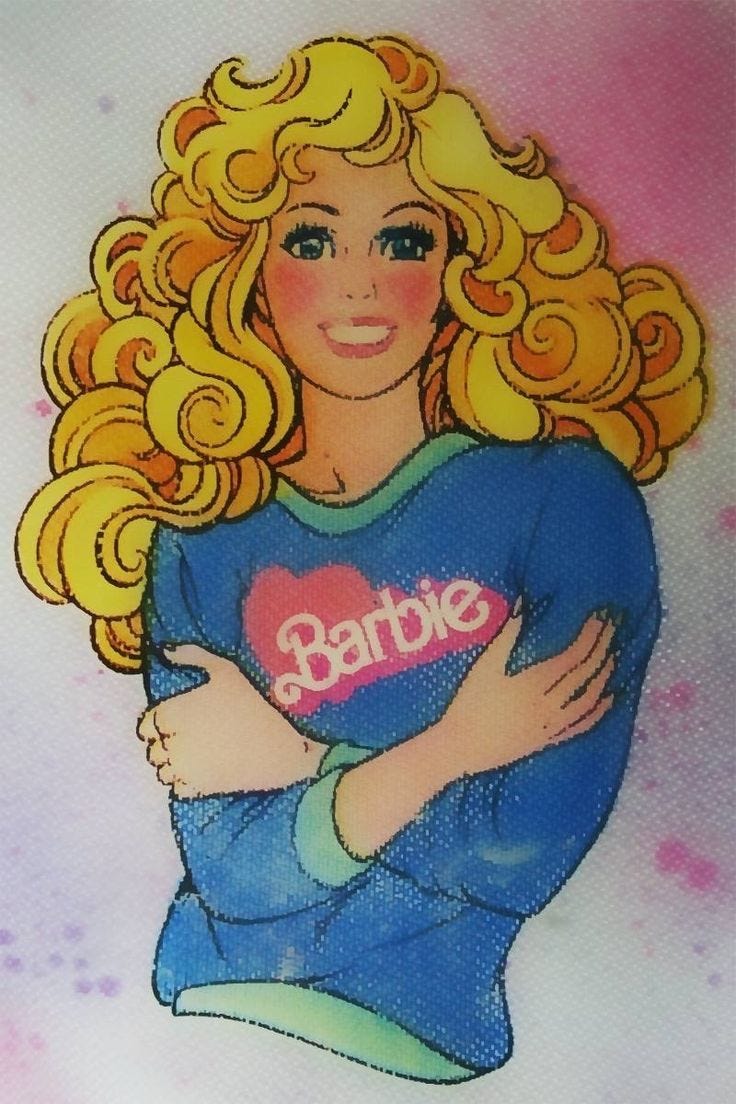Anything is not everything
Barbie's message of 'we girls can do anything' emboldened me to believe its truth. I could do anything I put my mind to. So...why don't I feel like I have it all?
The black-and-white landscape startles me as I walk up the stairs. Pen strokes of varying lengths, shapes, speed and thickness conjure lines of pine trees on the mountain in the distance, the sagging outline of an old barn emerging from a forest of dense aspen, all foregrounded by a rickety fence claiming a boundary. The title: ‘Before the fire, Vandana, Montana’. For a moment, my breath hitches. I am stunned out of time; I am standing in front of this farmhouse, I am stricken by its loss.
But I am actually standing in the back room of an art-shop-come-gallery space in a small town in the East of England. The piece in front of me is drawn by one of my oldest friends in Norfolk, whom I met in 2008 and immediately bonded with as a fellow North American. A gifted artist, she works in oils, watercolour, marker pen and pastel. She creates landscapes imbued with loss and wonder, desolation and possibility.
Her skill, talent and dedication exceed creative standards. But she is not headlining a gallery in NYC. She is not raking in millions in Non-Fungible Tokens. She is not an animator at Pixar studios, as she dreamed of being when growing up drawing and sketching in the Midwestern United States.
Often, we spend at least some of our time together wondering how we ended up ‘here’.
‘Here’ can stand for both what we have and what we have not. ‘Here’ might be:
Living in the county of Norfolk, which neither of us knew existed before we turned 20 and 27, respectively
Working at a local bookshop
Being a mother of two boys under ten
Not being a mother to anyone
‘Here’ might also be:
Not being a head animator at Pixar
Not starring in a Hollywood feature film
Not using our degree/years of education in relation to what we do to earn money
Not being a successful professional something-or-other
Not being known for or selling our art
We often wonder back and forth why we had such strong expectations that we’d end up somewhere other than ‘here’. Where had we thought we would end up? Who gave us those ideas? When did those thoughts and ideas become expectations, expectations so solid we regularly need to shake ourselves free of them, to remind us to get back to this actual life that we are actually living.
Because of our shared cultural upbringing, I’ve developed a theory that our particular brand of expectation has arisen through a conjunction of three factors. And these can all be traced back to a campaign run by Mattel in 1984:
‘We girls can do anything…right, Barbie?’
Growing up as a girl in North America in the 1980s made you heir to three essential messages:
Psychological: If you believed in yourself, you could do whatever you wanted. The self-esteem movement fuelled everything from classroom slogans to pop parental psychology. Posters in my classroom read ‘Shoot for the moon, and if you miss, you'll land among the stars’, ‘Dream big’ and ‘You can do it!’.
Material and consumerist: In the fast-paced, greed-is-good, dedication to ascent consumerist model, the focus was on getting to the next level: the big promotion, the next thing. ‘Working up to the top from the mailroom’ was the most desirable career path: the perfect combination of meritocracy, prioritising work before all else, and that ineffable American moxie.
Socio-political: Second-wave feminism had peaked, and we were living off the spoils. Not only could any woman do anything she put her mind to, but she could also have everything she wanted. She — you — could have it all.
[Of course, I didn’t realise that all these were also predicated on being white, middle class and able-bodied. Those assumptions were still invisible to me, and so went without saying. Since I ticked those boxes, I also assumed the rest: wholesale.]
I was three years old when I watched this ad for the first time. I didn’t remember the exact careers and life choices it featured, but upon rewatching I’ve made this list:
Astronaut
Baseball player
Mom in office attire (corporate success) shopping for groceries with daughter in tow (familial success) = having it all
Dress-up fashion model
(Interspersed with dancing and dating Ken while wearing sequined outfits)
Though I can still sing along to the chorus forty years later, I didn’t remember all the verses. I re-listened and transcribed them: here are the key phrases I imbibed unconsciously:
We can be whatever we want
Aim just as high as the sky
Anything is possible as long as we try
We love working from 9-5
We can dream dreams and make them come true
Nothing’s worth doing that we girls can’t do
Question: What’s wrong with epitomising a can-do attitude that encourages you to work hard and put your mind to anything you want?
Answer: The misplaced assumption that an attitude and belief is all that is required for success. And success — defined in a glitz-and-glamour, top of the pile ascendency — is assured. It negates any structural inequalities, unconscious biases, or the simple fact that not everyone who works hard will get to the top.
The biggest deciding factor in any one person’s socio-economic status is their parents’ wealth. While the meritocratic dream fuels the economy, it doesn’t hold up to the data. And if even if you’ve been gifted a place in today’s middle-class, you’ll still find yourself in a fixed slot in a hierarchical structure. This complex socio-economic melee can’t be navigated solely by dreaming big and trying hard.
The conflation of working hard and ‘making it’ ultimately confused my motivations and, by extension, exacerbated my confusion about why I ended up ‘here’. I dreamed so, so big. And now, I find myself befuddled rather than grateful at the privileged, comfy, plush life I lead. ‘But’ I keep saying.
But I’m not a doctor. Or a corner-office worker. Or a world class gymnast. Or an astronaut.
Day to Night Barbie
This Barbie epitomised the do anything and have it all 80s culture. Out of the box, she had a matching skirt suit and jacket, carried a briefcase and wore a wide-brimmed flat brim hat: ready for a day at the office.
But underneath her suede blazer she wore a sequined strappy top; flipping around the lower part of her suit revealed a chiffon-style evening skirt. Restyle her cravat as a swishy scarf, swap her two-tone pumps for open-toed mules and ditch her briefcase for an evening bag.
Slay in the boardroom by day, then swoosh into a cubicle for a costume change and head out on the town. Like the Sex and the City ensemble rolled in to one, Day to Night Barbie symbolised reaching the 1980s capitalist dream while partying into the night with the perfect hetero-partner on your arm. No hangovers, and no glass ceiling.
I’ve already written about how I couldn’t hack it in the corporate world, and how a short-lived late night lifestyle ended in sobriety and decidedly not-brat-ness. Even before these attempts, I’d been working through Barbie’s list of dream careers, from gymnast to fashion model to jazz dancer (though I didn’t commit to any of these past adolescence). I approached each one with the bravado of a girl who knew she could do anything. I discarded each with an entitled certainty that the next one would come as easily.
But as I blazed through each one, I didn’t ascend by default. No promotions up the ranks. No gold medals after a perfect vault. No Academy Award. No smashed glass ceiling. I have a few other accolades, I’ve ticked some boxes.
But I don’t have it all.
Stereotypically Ordinary
I’d forgotten about this image. I had a pink Barbie backpack when I was six, and emblazoned on its zip-up flap was this girl-next-door blonde-haired Stereotypical Barbie.
Sure, her eyes are doll-shaped, her teeth so perfect they’re invisible (there isn’t even a line distinguishing the top from the bottom) and her hair cascades in perfect yellow curlicues.
But she’s also in a sweatshirt. She’s not dressed as an astronaut, or a dentist, or a gymnast, or a ballerina, or a princess. She’s as ordinary as Barbie can get.
In Greta Gerwig’s 2023 Barbie, everyone quoted America Ferrera’s speech: the ‘It is literally impossible to be a woman’ one.
But it was Margot Robbie’s lines that sunk deep into my Mattel-pink heart:
‘I’m not Stereotypical Barbie pretty. And it’s not just that. I’m not smart enough to be interesting. I can’t do brain surgery; I’ve never flown a plane. I’m not the president. No one on the Supreme Court is me. I’m not good enough for anything.’
Even Stereotypical Barbie played by gorgeous Margot Robbie has to come to terms with the fact that she didn’t do everything she believed she could. She doesn’t have any of the titles, accolades or outfits of her peers. She didn’t reach for the stars, or win a gold medal, or become president. Actually, she didn’t do anything.
Ultimately, each of us has to come to terms with our ordinariness.
‘What about Ordinary Barbie? She’s not extraordinary. She’s not president of anything, or maybe she is. Maybe she’s a mom, maybe she’s not. Because it’s okay to just want to be a mom, or to wanna be president, or a mom who is president, or not a mom who is also not president. She just has a flattering top, and she just wants to get through the day feeling kinda good about herself.’
Each time we have this conversation, my friend and I draw the same conclusion. We actually just want to be ordinary. We don’t want to have spent our 20s and 30s ascending the career ladder. We don’t want to enter politics to run for president, to travel to London for auditions in an attempt to be famous, to work 80 hour weeks to scramble to the top of the animation team at a cutting-edge CGI studio.
We want to make our art, write our stories, be here now. Draw finely-detailed, perfectly scaled landscapes of windswept prairies. Write short stories and publish fortnightly Substacks. We want to be utterly original in the way that every human being can be, but without the hype.
But we can’t deny our conditioning. We feel the tug each time, the pulling towards the yearning, or hoping, or comparing. The theme tune to the Mattel commercial plays vaguely in our background, taunting and soothing all at once.






